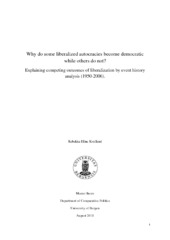| dc.description.abstract | This thesis sets out to explain the outcome of liberalization processes across the globe during the post war period, the research question being: When a regime liberalizes, what affects the risk of the process ending with either democratization or authoritarian reversal? Scholars of comparative politics have strived to explain the many regime changes throughout the post war period to the present, in particular, democratic transitions. As more and more hybrid regimes, neither fully democratic nor autocratic, has been recognized in the literature, the debate has acknowledged that the traditional transition paradigm must be modified as to disentangle the process of political liberalization from that of transitions. Rather, democratic transition is only one possible outcome of political liberalization - it might as well end with authoritarian reversal. However, despite this acknowledgement, the various outcomes of liberalization processes has not been systematically compared and explained on a global scale. Here lies the motivation of this thesis. A process-oriented approach traces historical events of political liberalization by observing movements upwards along the Polity IV scale. This generates 115 spells of liberalization in the analysis period from 1950 to 2006, by which a 105 is examined due to loss of data on the independent variables. Following the perspective of structural contingency, the outcome of liberalization - democratic transition or authoritarian reversal - is examined by an event history analysis, more specifically, Cox competing risk models. The analysis results imply that different endpoints of liberalization can be explained by economic growth performance, ethnic fractionalization of society, type of autocracy, presence of legislative assembly and the conflict level during liberalization periods, while the inclusion of opposition parties do not significantly affect the outcome. | en_US |
